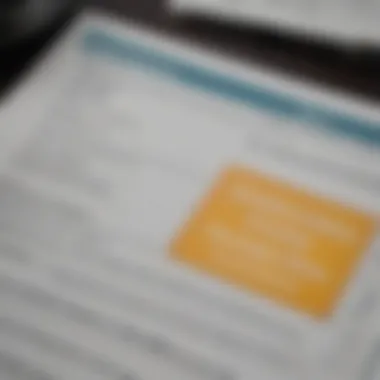Financial Responsibilities of Getting a NY Real Estate License


Intro
Entering the world of real estate in New York can seem like stepping into a complex maze. Before you even set your foot on the property ladder, there's a considerable amount of financial investment involved in obtaining a real estate license. This investment goes beyond just the typical fees; it encompasses a variety of costs that aspiring real estate agents must navigate. Understanding these financial commitments is crucial, not just for budgeting purposes but also for planning your career trajectory in this competitive field.
As you embark on this journey, you’ll want to grasp the costs associated with each phase of the licensing process. From the money spent on pre-licensing education to the fees associated with examinations and applications, every dollar counts. In this article, we will delve deeper into these costs and offer practical advice on how to manage them effectively. \n
Definition of Key Terms
Understanding a new field often starts with knowing the lingo. Real estate, like many industries, has specific terminology that shapes its conversations and practices. Familiarizing yourself with these terms is essential to making informed financial decisions.
Explanation of Important Financial Concepts
- Pre-licensing Education Fees
Before you can sit for the licensing exam, you are required to complete a certain number of education hours from an accredited school. This usually comes with a price tag, which varies depending on the institution. Remember that higher education may provide better knowledge and higher earning potential. - Exam Fees
After completing your coursework, the next hurdle is the licensing exam. Typically, this involves a fee paid to the state testing center. Not passing the test leads to additional expenses for rescheduling and retaking it, which can stack up quickly. - Application Costs
Once you pass the exam, there’s another fee to apply for your license. This can be overlooked but is a crucial step in officially starting your career. - Continuing Education Requirements
Many states, including New York, require ongoing education to maintain your license. This is yet another cost that you’ll need to consider as you plan your financial moves in the industry.
"The money you invest in your education will pay off in the long run. Start right, finish strong."
Industry Jargon and Acronyms
Be ready to encounter a slew of abbreviations and jargon that can either confuse or enrich your experience. Here’s a selection to get you acquainted:
- REALTOR®: A real estate professional who is a member of the National Association of Realtors and adheres to its ethical guidelines.
- MLS: Multiple Listing Service, a database that agents use to find properties that are available for sale.
- C.E.: Continuing Education, mandatory learning that licensed agents may need to undertake periodically.
- NYS: New York State, the jurisdiction governing real estate practices.
Understanding these terms not only enhances your communication with colleagues but also helps you better navigate the financial commitments required in the industry. Armed with this knowledge, you can approach your licensing journey with confidence and clarity.
Overview of Real Estate Licensing in New York
The importance of understanding real estate licensing in New York cannot be overstated. As one of the most dynamic and competitive real estate markets in the country, New York presents both opportunities and challenges for aspiring real estate agents. With a real estate license, individuals can engage legally in property transactions, providing services that are in high demand in urban hubs and suburbs alike. In this landscape, obtaining a license is both a necessity and a significant financial commitment.
Understanding the Licensing Requirement
In New York, every real estate agent must hold a valid license in order to operate legally. This requirement is governed by the New York State Department of State, which establishes the legal framework for the licensing process. A basic understanding of these requirements is crucial.
To qualify for licensure, candidates need to complete a 75-hour pre-licensing course from an approved provider. This course covers essential topics like property laws, market practices, and ethical considerations. Following the completion of the course, candidates must pass a written examination that assesses their knowledge and readiness to engage in real estate transactions.
Failure to meet these requirements can lead to significant delays or even the inability to obtain a license altogether. Hence, prospective agents should approach the process with diligence, ensuring they grasp each step of the way.
Purpose of a Real Estate License
A real estate license serves several pivotal purposes within the marketplace. First and foremost, it serves as a legal credential that empowers agents to represent clients in buying, selling, or leasing properties.
This licensure also provides a level of trust and credibility within the industry. Clients often look for professional qualifications that suggest reliability and expertise. A licensed agent signals a commitment to professionalism, as they are subject to state regulations governing their conduct and operations.
Furthermore, a license increases an agent's earning potential. Real estate transactions often involve significant sums of money, and agents typically earn commissions based on these transactions. Without a license, individuals are barred from receiving these commissions legally. Ultimately, investing in a real estate license is not just about meeting legal requirements; it's a strategic step toward establishing a sustainable career.
"Having a valid real estate license is not merely a formality; it opens doors to opportunities in a thriving market."
Thus, understanding these fundamentals of real estate licensing in New York equips you with the knowledge to navigate your career path more effectively. With clarity about the requirements and the significance of licensure, aspiring agents can proceed with confidence as they embark on their journey into New York's vibrant real estate landscape.
Initial Investment: Cost Breakdown


Understanding the financial commitment necessary for obtaining a real estate license in New York is crucial for anyone considering this career path. The costs associated with this process can add up quickly. So, diving deep into Initial Investment: Cost Breakdown can offer clarity on where your money will be going. It helps to provide you with a clearer picture, aiding you in budgeting adequately for your future endeavors in this competitive market.
Pre-Licensing Course Expenses
Before aspiring agents can even take the licensing exam, they must complete a state-approved pre-licensing educational course. This course is fundamental, as it equips future agents with essential knowledge about real estate principles, practices, and laws. Depending on the institution — whether an online platform or a brick-and-mortar school — costs for these courses can vary widely. Expect to pay somewhere between $300 to $1,000. It’s worth shopping around and comparing course contents, instructors, and formats. A good education will pay dividends in the long run.
Exam Registration Fees
Once you've finished the course, the next step is passing the licensing exam, for which you'll need to pay an exam registration fee. This fee is generally about $15 to $25, which is relatively minor compared to other costs but should not be overlooked. It's essential to be well-prepared for the test; after all, it's a pivotal step in becoming a licensed real estate agent. Consider investing in practice exams or study groups as part of your preparation.
Application Fees for License
After passing the exam, you need to submit an application to obtain your real estate license. This comes with its own set of fees, typically ranging from $50 to $200. The precise fee may depend on your specific situation, such as any previous licenses in other states or any special circumstances related to your application. It’s advisable to double-check the exact amounts on the New York State Department of State website to ensure that you have the most current information.
Background Check Costs
Lastly, a vital aspect of the licensing process is the background check requirement. The purpose of this check is to establish that you have a clean record which is important in the field of real estate. Expect to pay around $100 or more for the background check. This cost is non-negotiable and generally required regardless of where you are in the licensing process. Make sure to keep this in mind as you assess your total investment.
It's essential to budget for these initial costs to set a steady course for your real estate career.
In summary, navigating through the Initial Investment: Cost Breakdown requires diligence, but understanding these elements will set a solid groundwork for upcoming endeavors in the real estate world. Each of these expenses contributes significantly to ensuring you are licenced and ready to enter this dynamic field.
Training and Educational Expenses
Every journey begins with education, and the path to becoming a real estate agent in New York is no exception. Understanding the financial implications of training and educational expenses is key for anyone looking to get their feet wet in this competitive field. The right training not only prepares you for the licensing exam but also gives root to your future success in the industry. As you navigate this costly venture, consider it an investment in your professional future.
Choosing a Real Estate School
Selecting a real estate school can feel like choosing a needle in a haystack. With a sea of options available, from local institutions to online programs, it’s vital to assess each one carefully. Think about the reputation of the school, the expertise of the instructors, and the breadth of the curriculum offered. A solid school should not just prepare you for the exam; it should also arm you with practical knowledge to help you thrive in your career.
- Accreditation matters: Make sure the school is accredited by the New York State Department of State. This ensures that your education meets the necessary standards.
- Student reviews: Check online forums or even social media platforms like Reddit for candid reviews from former students. This can provide insight beyond testimonials.
- Cost analysis: Prices can vary significantly from one school to another. Compare your options, but don’t compromise quality for a slightly cheaper rate.
Choosing the right school involves digging deeper than just surface-level details. Make sure to look into how many students pass the licensing exam on their first attempt—this can serve as a strong indicator of a school’s effectiveness.
Online vs. In-Person Courses
The advent of technology has transformed the educational landscape, offering both online and in-person real estate courses. Each format has its own set of advantages and considerations, so understanding these can help you make a well-informed decision.
Online Courses:
- Flexibility: This format allows you to study at your own pace, providing a level of convenience that fits well into busy lifestyles.
- Cost-effective: Usually, online courses are cheaper as there are fewer overhead costs for the providers.
- Accessibility: You can access materials from anywhere, making it easy to juggle your studies around work or family responsibilities.
In-Person Courses:
- Networking opportunities: Face-to-face interaction with instructors and fellow students can foster relationships that may benefit you in your career.
- Structured learning: For those who might struggle with self-discipline, a scheduled class environment creates accountability.
- Practical experience: Some in-person courses offer simulations or role-playing exercises that can help in developing real-world skills.
Ultimately, the decision between online and traditional courses hinges on personal preference and individual learning styles. Evaluate your own needs and resources to see which aligns better with your educational goals.
"Investing in knowledge pays the best interest." - Benjamin Franklin
Additional Financial Considerations


Understanding the financial commitment of acquiring a real estate license goes beyond the initial course fees and licensing exams. There are several additional financial considerations that an aspiring real estate agent in New York must take into account. These factors can significantly impact one’s budget and influence overall profitability in the long run.
A well-rounded grasp of all costs involved allows for smarter budgeting, ensuring that there's enough financial cushioning as one navigates through the ups and downs of the real estate market. After all, it's not just about getting a license; it's about sustaining a career in a competitive field.
Cost of Study Materials
Once you've secured a spot in a pre-licensing course, the reality sinks in that you'll also need various study materials. Books, online resources, and practice exams can add up quickly. Expect to spend anywhere from $100 to $300 on these materials. They're crucial not just for passing the exam but also for building a solid foundational knowledge. This prep is your stepping stone to gaining the expertise necessary to thrive.
When selecting materials, consider looking for updated textbooks that provide insights into New York's specific real estate laws and practices. Study guides that include sample questions can also be invaluable—you want to ensure you're not only familiar with the material but also comfortable with the question formats.
Membership Fees for Real Estate Associations
Joining real estate associations, such as the New York State Association of Realtors, is not just a formality; it's a strategic move. Memberships can range from $200 to $500 annually. Though this amount may seem steep upfront, the benefits of networking, access to industry resources, and potential leads can justify the investment.
Being a part of such organizations often provides credibility, which is essential when establishing oneself in this industry. Additionally, members may access exclusive training programs, professional development workshops, or industry updates that can enhance their business acumen and help in client interactions.
E&O Insurance Premiums
Another financial aspect to consider is Errors and Omissions (E&O) insurance. This policy protects professionals from claims of inadequate or negligent actions—a critical safety net in the unpredictable world of real estate. Premiums can vary widely, but a typical range falls between $300 and $1,000 annually.
Investing in E&O insurance shields you from dire financial repercussions should a client raise concerns about your services. In a field where reputations can be made or broken on client experience, such coverage is not merely an optional extra but rather a necessity.
In summary, these additional financial considerations combine to create a comprehensive view of what it costs to operate as a real estate agent in New York. With a detailed understanding of costs, you can plan better and secure your footing in the bustling real estate market.
Long-Term Financial Implications
The pursuit of a real estate license in New York is not merely a step into a new profession, but a substantial financial commitment that has far-reaching effects. Understanding the long-term financial implications is crucial for anyone considering this career path. This segment examines essential elements that contribute to ongoing costs and potential returns on investment, equipping prospective agents with the insights necessary for informed decisions.
Continuing Education for License Renewal
Real estate professionals in New York are required to engage in continuing education every two years to maintain their licenses. This requirement is more than just a bureaucratic hurdle; it’s a way to ensure that agents remain updated on industry changes, regulations, and market trends. Typically, the cost of these online or in-person courses can range from $50 to $500 depending on the provider and the depth of the material covered. It's a cost that must be budgeted.
- Types of Courses: These courses usually offer insights into new laws, ethics, and emerging market trends.
- Flexible Options: Many providers offer online classes that can be more economical and easier to fit into a busy schedule.
- Certification Costs: There may also be fees associated with course completion certificates or submitting proof of education to the state.
With changing regulations, keeping up with education isn't just a requirement – it's a necessity. Ignoring this aspect may lead to penalties or even loss of licensure, which carries its own heavy financial implications.
"Continuous learning isn’t an option but a necessity in the evolving landscape of real estate."
Ongoing Marketing and Business Expenses
Once you've got your real estate license, the spending doesn’t stop. In fact, many agents find that their marketing and business expenses quickly add up. After all, in real estate, visibility is critical.
- Branding: Building a personal brand often requires investment in both time and money. Costs for logos, business cards, and website development can quickly escalate. Expect to spend from $100 to several thousand dollars depending on your ambitions and strategies.
- Advertising: Running advertisements on platforms such as Facebook, Google, or through local media is crucial to attracting clients. It's not just about creating listings; your name needs to be out there. Marketing budgets can vary widely but should be factored into your ongoing expenses.
- Networking Events: Regular attendance at industry events, conferences, and local meetings may also incur costs, ranging from registration fees to transportation and accommodation.
The truth is, without proper marketing, even the most qualified agents may struggle to gain traction in a crowded market. The investments made here often pay off in terms of contracts secured and commissions earned. However, a savvy agent will keep close tabs on expenses and adjust strategies to optimize them.
In summary, while obtaining a real estate license can be the first step toward a fruitful career, understanding and preparing for the long-term financial implications is just as vital. Continuous education and marketing efforts comprise a significant part of that game plan. By keeping these aspects in mind, agents can build a sustainable career that ultimately pays dividends.
Assessing Return on Investment
Assessing the return on investment (ROI) when obtaining a real estate license in New York is crucial for aspiring agents. This part of the journey can help professionals gauge whether their financial inputs align with the potential outputs. It’s more than just math; it’s about understanding what's at stake and where your efforts may lead.


Evaluating ROI involves breaking down both the costs you incur and the earnings you can anticipate. You’re putting money, time, and effort into this pursuit, and a clear picture of the potential earnings helps you strike a balance. A real estate career can be lucrative, but the road to success is lined with expenses that can sneakily add up.
There are several focal points to consider:
- Direct Income Potential: This depends on factors like commissions from sales, rental transactions and the area where you choose to work. Real estate is commission-based, so it’s practically crucial to project how many transactions you might close in a year.
- Market Conditions: The New York real estate market can fluctuate significantly. This can impact the potential earnings significantly, from booming sales to slow periods.
- Networking Benefits: Building relationships with clients and other real estate professionals may just pay off down the line. Future referrals and connections can become vital revenue streams.
"The best investment on earth is earth itself." – Louis Glickman
All these elements shape the financial landscape for new agents. Now, let’s dig into how to understand your potential earnings.
Understanding Potential Earnings
Understanding potential earnings is paramount for anyone considering a career in real estate. The initial costs may tempt one to think twice, but the potential gains can often outweigh the upfront investments.
Most new agents start earning through commissions. In New York, commissions typically average at around 5% to 6% of the property sale price. However, splitting this with your brokerage often happens, so your actual cut can be around 50% to 70% after that.
For example, if you sell a home priced at $1 million, a 5% commission results in a total commission of $50,000. After sharing with a brokerage, your earnings might drop to around $25,000 or $35,000, depending on your agreement.
- Here’s a quick look at factors that can increase your earnings:
- Client Acquisition: The number of clients you bring in greatly influences your income.
- Property Types: Selling higher-value homes can significantly boost your commissions.
- Work Ethic: Investing time into learning the market and your clientele can yield greater results.
Understanding these dynamics clearly paves the way for a realistic financial picture as you pursue this career.
Market Trends in New York Real Estate
The New York real estate market serves as a double-edged sword – it offers vast potential for profit but also presents challenges that can be daunting.
Monitoring market trends helps to fine-tune your strategies and expectations. According to recent data, as of late 2023, there’s been an increase in property sales, particularly in suburban areas as buyers flock from the busy metropolis to seek more space. This exodus has led to a competitive environment in those regions, potentially driving up home values and your earning potential.
Key trends to watch:
- Supply and Demand: The increasing demand for homes, especially post-pandemic, has led to rising prices. It’s essential to keep an eye on these shifts.
- Interest Rates: Rates can have a significant effect on buying behavior, making it crucial for agents to stay informed about current lending rates. This can either stimulate or slow down the market.
- Urban vs. Suburban: The allure of city living versus the appeal of spacious suburbs drastically differs, affecting how you market properties and who your clients are.
The landscape may shift often, but with a keen eye on these trends, real estate agents can position themselves strategically to maximize earnings over time.
Finale: Weighing the Costs and Benefits
In the realm of real estate, as in many other fields, knowledge is paramount. Understanding the financial commitment of obtaining a real estate license in New York is not merely an exercise in cost analysis; it serves as a crucial cornerstone for anyone considering a venture into this bustling market. The costs can seem daunting at first glance, but when assessed against the potential rewards, a clearer picture emerges.
From pre-licensing education to ongoing expenses, each financial outlay carries weight. It's vital to note that while the upfront costs may accumulate quickly, the opportunity for higher earning potential is equally significant. Moreover, evaluating these expenses in the context of personal and professional goals can yield insights that aren't immediately visible.
Three primary elements to consider are the initial investment, long-term implications, and the return on investment you can expect in the realm of real estate. Here’s a breakdown of what needs to be weighed thoughtfully:
- Initial Investment: This encompasses everything from education to examination fees and initial marketing efforts. Understanding these costs helps aspiring agents prepare a realistic budget.
- Long-Term Financial Implications: Ongoing education is a requirement that cannot be overlooked. By committing to continuous professional development, agents ensure they remain competitive and informed in a rapidly changing market.
- Return on Investment (ROI): The potential earnings that come from being a licensed real estate agent can be substantial. However, much depends on one's dedication, skill set, and market conditions.
Ultimately, weighing these factors helps prospective agents identify if this career path aligns with their financial and personal aspirations.
Coupled with market trends, potential earnings, and professional growth opportunities, the decision on whether to pursue a real estate license must be informed by both quantitative and qualitative analyses. The financial commitment is not just about dollars and cents; it’s about enhancing future earning potential and career satisfaction.
Final Thoughts on Licensing Investment
Obtaining a real estate license in New York is a significant investment, both financially and professionally. As you reflect on your decision, consider the prospect of utilizing your license as a tool for growth, not just a means to an end. The costs associated with licensure should not deter you; rather, regard them as stepping stones toward building a more substantial future.
It's wise to research and seek guidance to navigate the financial mazes presented by licensing requirements. Networking with seasoned professionals or consulting local real estate boards can provide insights that textbooks often overlook. By making an informed and well-considered decision, you position yourself not just to succeed but to excel in the competitive arena of real estate.
In summary, the journey toward obtaining your real estate license is filled with costs and commitments that are worthwhile when balanced with the prospect of growth and profitability.















